Beijing's 'cleansing' of Hong Kong industries: Who will be the next target?
Amid taunts of being a "malignant tumour" by Chinese state media and being effectively blacklisted by Hong Kong's education bureau, the Hong Kong Professional Teachers' Union (HKPTU) has announced its dissolution. While it is a professional organisation, it has long been associated with being a pro-democracy advocate. Is the HKPTU among the long line of those to fall in Beijing's efforts to "cleanse" various Hong Kong sectors? Who will be next? Zaobao's China Desk finds out more.
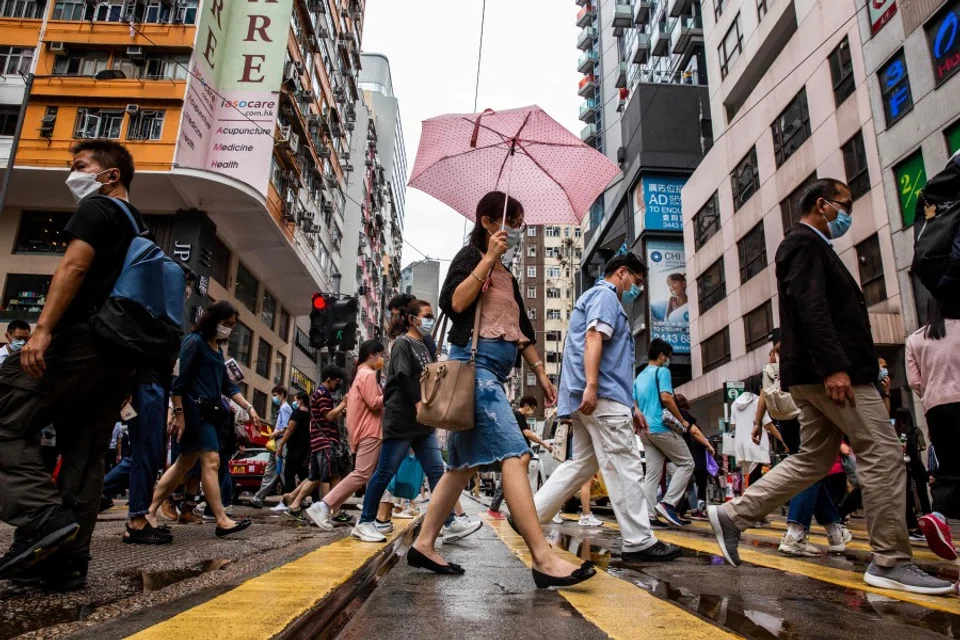
On 10 August, the Hong Kong Professional Teachers' Union (HKPTU) announced that it will be dissolved, two weeks after mainland Chinese media slammed this 48-year-old organisation - the biggest trade union representing a single profession in Hong Kong - as a "malignant tumour". The news has rocked Hong Kong's education sector and society at large.
People's Daily on 11 August ran a commentary saying that the HKPTU deserved its fate, even quoting a line from a poem by Mao Zedong meaning that one should chase down the fleeing enemy with the last of one's strength (宜将剩勇追穷寇), adding that any forces aimed at opposing China and causing trouble in Hong Kong will be exterminated. A Xinhua commentary also harshly criticised the HKPTU for calling itself a teachers' union while encouraging "independence" and fanning violence, and stirring trouble in Hong Kong, until it ended up in its current sorry state, which it completely deserved.
Pro-Beijing Hong Kong newspaper Ta Kung Pao said in an editorial: "The dissolution of the HKPTU definitely does not mean the end of the problem. A handful of key persons are involved in unlawful activities, which cannot be written off. The sudden disbanding of the HKPTU also goes against its constitution, with no clear statement on how its vast assets will be handled. The law enforcement agencies have to investigate and give an account to the education sector and the community."
What kind of organisation is the HKPTU?
What kind of organisation is the HKPTU, and why is it a thorn in Beijing's side?
The HKPTU is a civic group established by teachers in 1973, with about 95,000 members, half of which are primary and secondary school teachers. Its founder and first chairperson was Hong Kong's late pro-democracy veteran Szeto Wah, founding chairman of the Hong Kong Alliance in Support of Patriotic Democratic Movements of China.
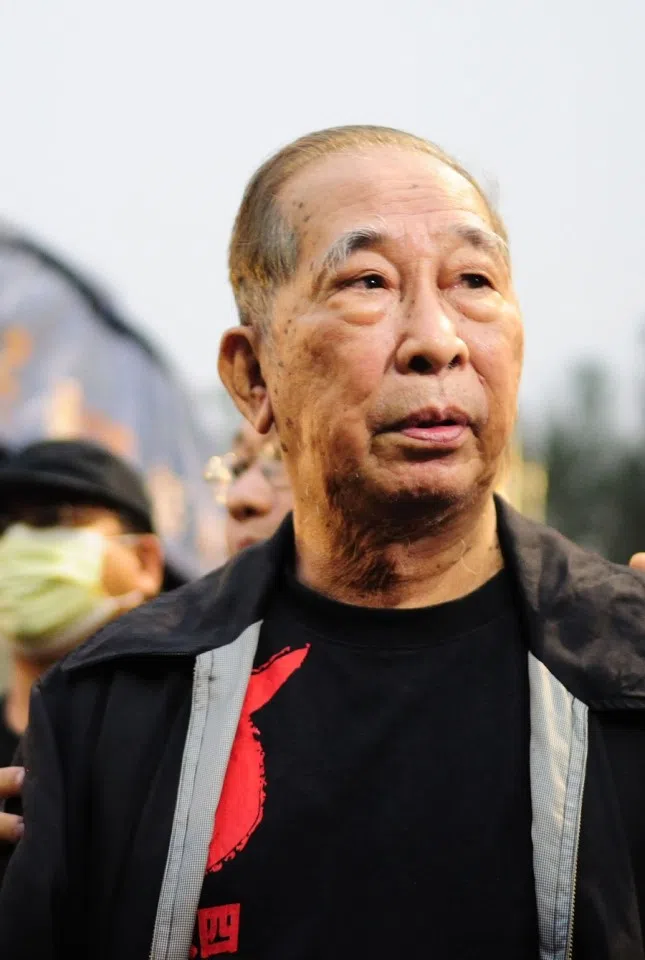
Although it is a workers' organisation, the HKPTU has great influence on HK's political sector and society, and is an important supporter of Hong Kong's democracy movement. Apart from working for teachers' rights and professional development, the HKPTU is deeply involved in Hong Kong politics; for years, it held seats in the Legislative Council under the education sector, until the mass resignation of pro-democracy members in November last year.
In late July, two mainland China news agencies led the way in blasting the HKPTU.
On 30 July, Xinhua ran an article harshly criticising the HKPTU as a "malignant tumour" that was opposing China and causing trouble in Hong Kong. It said if Hong Kong's education sector was to be set straight back on track, the HKPTU had to be thoroughly investigated and the tumour removed. The same day, People's Daily also published a piece saying that the HKPTU was manipulating politics and trying to monopolise Hong Kong's pedagogical narrative, calling it the "biggest tumour" in Hong Kong's education sector and the root of social chaos in Hong Kong.
With the harsh citation of this litany of "sins" by the HKPTU, on 31 July, Hong Kong's education bureau announced that it would cease working with the HKPTU. The bureau will no longer regard the union as a professional body, and will neither engage in any formal or informal meetings with it, and the union's teacher's training courses will also no longer be recognised.

The embattled HKPTU released a statement on 31 July saying that the union had always been concerned with the state of education and the welfare of the teachers and students, and had not instigated students to demonstrate. It said that since its establishment, the union had been concerned with the progress of the country and people, and opposed independence for Hong Kong. Subsequently, on 5 August, it announced the setting up of a working group on Chinese history and culture, to raise awareness of Chinese history and culture among teachers, and to nurture patriotism among students.
Between March and June this year, sensing a crisis, the HKPTU withdrew its membership from the Civil Human Rights Front (CHRF), Hong Kong Confederation of Trade Unions (HKCTU), Education International (EI), and the Hong Kong Alliance in Support of Patriotic Democratic Movements of China, in a bid to protect itself amid a worsening political environment.
But just as people thought that the union would start being less politicised and align with Beijing, HKPTU president Fung Wai Wah announced the union's dissolution on 10 August. At a press conference, Fung explained that Hong Kong's socioeconomic and political environment had changed in recent years, putting immense pressure on the union. While attempts were made to explore ways to continue, this was to no avail and the crisis could not be resolved, and the executive committee unanimously resolved to dissolve the union.
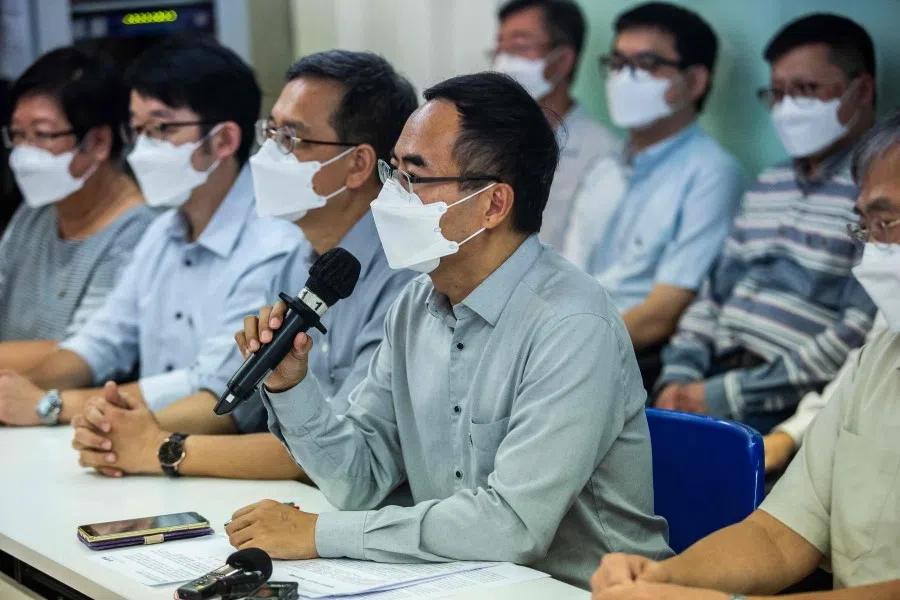
HKPTU long at odds with the government
Some analyses have it that following the tightening of Hong Kong's political space, it was expected that the strongly pro-democratic HKPTU would become a target for Beijing, which did not happen overnight.
Back in 2000, the HKPTU already went up against the Hong Kong government. According to online media outlet Initium Media, the HKPTU led the objections against the Language Proficiency Assessment for Teachers, which it criticised as creating pressure for teachers, putting it in opposition to the government for a period. And the HKPTU's relations with the Hong Kong government dropped to freezing point with the controversy over "national education" classes in 2012, and the Umbrella Movement in 2014.
Beijing has long been keeping an eye on the HKPTU after its frequent clashes with the Hong Kong government over the years.
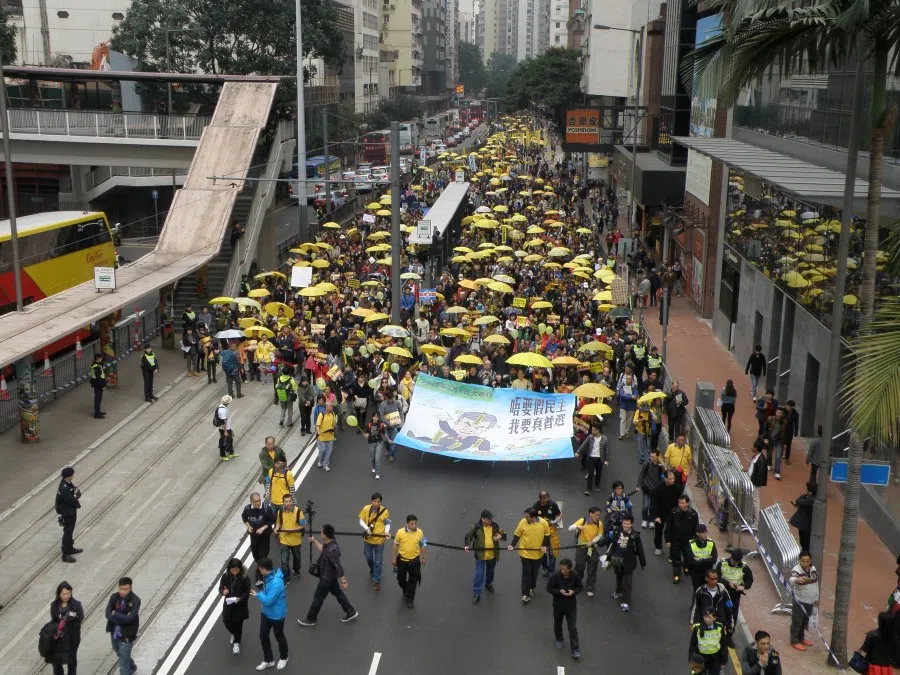
Reviewing the HKPTU's relationship with the government back in 2018, Fung said former Secretary for Education Eddie Ng was incompetent, and that there was no more room for negotiation between the HKPTU and the government.
During the anti-extradition movement in 2019, the HKPTU openly criticised the Hong Kong government, including calling for the government to drop the amendments to the extradition law, participating in CHRF marches, issuing statements criticising the police for abuse of authority, and filing a joint petition by the education sector. In October of that year, Xinhua ran a commentary naming and criticising the HKPTU for adding to the chaos by levelling mistaken and unfounded allegations against the police and "assisting the enemy", which was "unprofessional and biased".
In August last year, when the Hong Kong government announced a newly edited edition of Liberal Studies textbooks, the HKPTU again criticised the government, calling the new books a form of "political censorship". At the time, People's Daily ran an editorial calling the HKPTU a "malignant tumour" that was "brainwashing" young people under the banner of "anti-brainwashing", and calling for the government to watch out for organisations like the HKPTU obstructing the "purging" of educational materials.
Observably, Beijing has long been keeping an eye on the HKPTU after its frequent clashes with the Hong Kong government over the years. At the same time, with the expansion of the HKPTU's scale and influence, the threat of such clashes increases as well.
Looking at figures between 2020 and 2021, the HKPTU has approximately 95,000 members, and has been an influential force in the education sector. In comparison, the pro-Beijing Hong Kong Federation of Education Workers only has around 42,000 members.

According to a BBC report, the Legislative Council of Hong Kong has had a functional constituency for the education sector since 1985. Seats have always been held by members of the HKPTU including founding chairman Szeto Wah, senate vice-chairman Cheung Man-kwong, and vice-chairman Ip Kin-yuen, until Ip resigned with other pan-democratic legislators in late November last year.
Looking at figures between 2020 and 2021, the HKPTU has approximately 95,000 members, and has been an influential force in the education sector. In comparison, the pro-Beijing Hong Kong Federation of Education Workers only has around 42,000 members. Standing at half the size of the HKPTU, its influence is way less than the HKPTU as well.
Beijing determined to rectify Hong Kong's education sector
HKPTU's crackdown is Beijing and the Hong Kong government's latest move in rectifying Hong Kong's education sector, triggered by the anti-extradition movement in 2019.
Students play an important role in the many social movements that Hong Kong has experienced since 2014. During the 2019 anti-extradition bill protest, many Hong Kong youths, including primary and secondary school students, protested on the streets or in schools. As of May 2020, nearly one-fifth of the approximately 9,000 anti-extradition bill protesters arrested by the Hong Kong police are under 18 years of age. Hong Kong's education sector is accused of adding fuel to the fire, duping immature young people and inciting student protests.
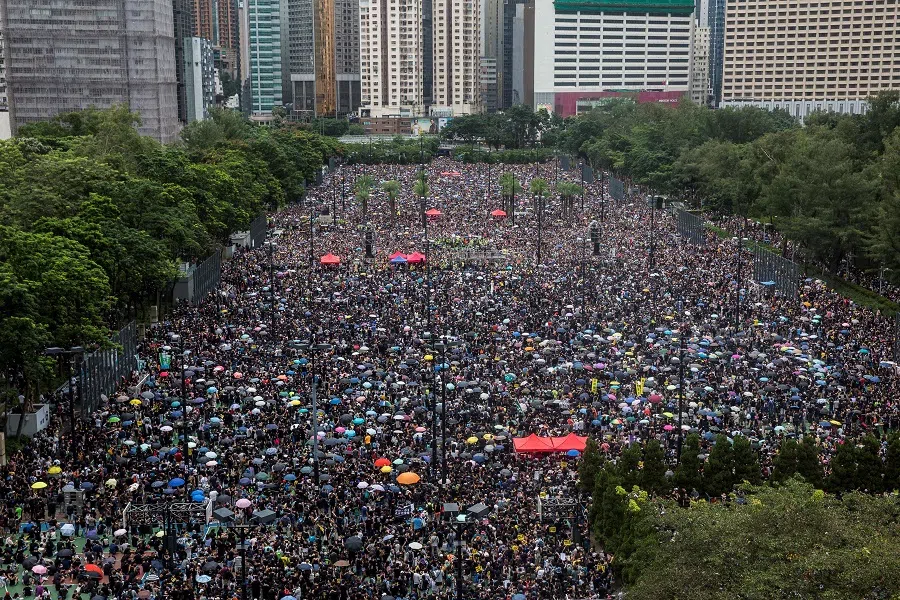
On 2 August, Hong Kong Chief Executive Carrie Lam criticised the HKPTU for putting its political stand above the education profession, and accused it of promoting its political views during the anti-extradition bill protests and spreading anti-government sentiment to schools. She claimed that the HKPTU has "hijacked" Hong Kong's education sector.
Beijing believes that Hong Kong youths are participating in social movements because the pro-democracy camp has long controlled the power and voice of the education sector. Thus, Beijing is determined to fully rectify Hong Kong's education sector. Apart from including national security-related content in the curriculum, they also want to ensure that the teachers teaching the material are singing the same as the organisations behind them. Undoubtedly, the stance, scale, and influence of the HKPTU make it an obvious rectification target.
Joshua Rosenzweig, head of Amnesty International's China team told BBC: "The rapid demise of Hong Kong's biggest teachers' union in the face of increasing hostility from the Hong Kong and central Chinese governments illustrates the level of fear permeating the city's education sector and wider civil society amid a relentless crackdown on dissent."
Some analysts think that, following the HKPTU, the democrats in Hong Kong's higher education sector will soon be eliminated as well.
Who is the next target?
Viewed from a larger perspective, the education sector is but one of the areas that Beijing has cracked down on following the implementation of the Hong Kong national security law last year. Earlier on, the Hong Kong government had already requested that all civil servants of Hong Kong take an oath or sign a declaration pledging their allegiance to Hong Kong and promising to uphold the Basic Law. As for the media side, the Hong Kong government has also cracked down on Apple Daily in June for its pro-democracy stance.
According to Hong Kong media, after the HKPTU, the next target of the authorities may be the HKCTU which has nearly 100 affiliates.
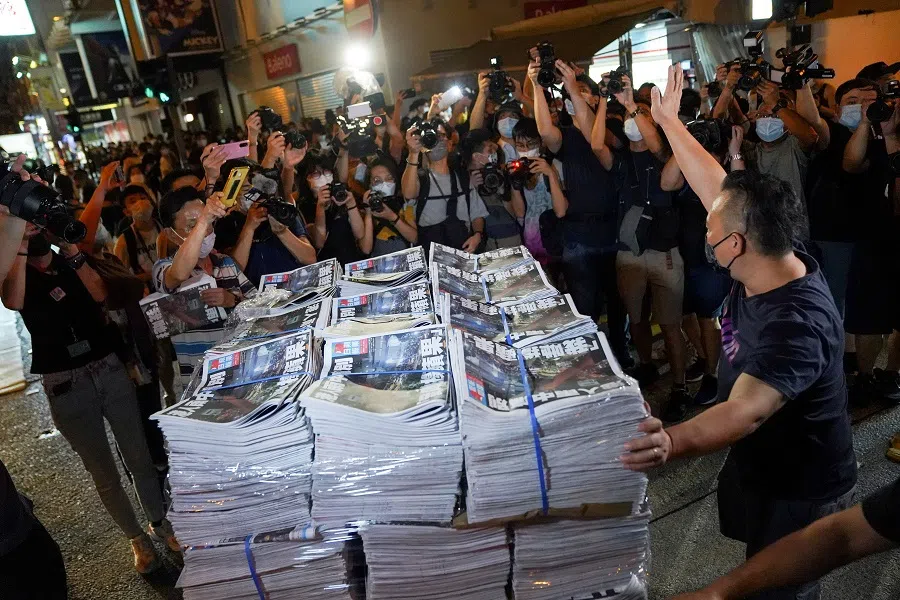
Rectification measures have swept across the fields of politics, civil service, media, education, and so on. Thus, the outside world can't help but ask: "Who's the next target?"
Article 9 of the Hong Kong national security law stipulates that the Hong Kong government "shall take necessary measures to strengthen public communication, guidance, supervision and regulation over matters concerning national security, including those relating to schools, universities, social organisations, the media, and the internet". Hong Kong Secretary for Labour and Welfare Law Chi-kwong also posted on his official blog in May that trade unions in Hong Kong also fall under the category of "social organisations" and authorities reserve the right to cancel their registration should they violate the national security law. Perhaps the various trade unions in Hong Kong would be facing rectification one after the other.
According to Hong Kong media, after the HKPTU, the next target of the authorities may be the HKCTU which has nearly 100 affiliates. Quoting the latest issue of East Week (《东周刊》), the Sing Tao Daily reported that the police's national security unit is already keeping an eye on the HKCTU as well as other affiliates and organisations that maintain friendly ties with the HKCTU, including the unions of social workers, health workers, aircrew officers, transport workers and so on. If found to have violated the law, they would also become targets of the national security unit.
It is rumoured that the HKCTU is being investigated by the police's national security unit for alleged violations of the Hong Kong national security law and money laundering. Insiders with information on the matter pointed out that in the past, the HKCTU was repeatedly suspected of receiving subsidies, colluding with external forces, and manipulating trade unions into participating in anti-China activities to disrupt Hong Kong.
The Sing Tao Daily reported that affiliates have recently withdrawn from the HKCTU one after the other. Members of the HKCTU admitted that under recent circumstances, it is tough to look for a new generation of leaders to take over. This has been a cause for concern for some affiliates. But members within the HKCTU will stick to their posts and there are no plans for the union to disband at the moment.
Some analysts think that the Hong Kong Bar Association and the Hong Kong Journalists Association may also be the targets of the authorities.

Some analysts think that the Hong Kong Bar Association and the Hong Kong Journalists Association may also be the targets of the authorities. Non-official member of the Executive Council of Hong Kong and senior counsel Ronny Tong said on 10 August that the relationship between executive members of the Bar Association and the Hong Kong and central governments has not been good in recent years.
The Hong Kong Journalists Association published its annual report titled "Freedom in Tatters" in July. The report said that under the national security law, the past year has been "the worst year so far for press freedom", which was left "in tatters" by the government. The report urged the Chinese National People's Congress to look into amendments and supplementary provisions of the national security law to safeguard press freedom - a statement that may further provoke the ire of Beijing.
Beijing's ongoing "cleansing" of various Hong Kong industries illustrates the deep encroachment of political forces into various fields of Hong Kong society over the years. While the next rectification target is still unknown, it is certain that a comprehensive "cleansing" of "malignant tumours" in the eyes of Beijing will come in quick succession. When that happens, we can be sure that Beijing will be heavy-handed in its moves.
Related: Hong Kongers losing their voice as district councillors quit? | Beijing's message behind the closure of Hong Kong's Apple Daily | Hong Kong's electoral reform: Powerful businessmen to lose influence in politics? | When 'new Hong Kongers' run the show, where do the old ones go? | Overhaul of Hong Kong's electoral system: Is it still 'one country, two systems'? | Eight months after national security law: What's become of Hong Kong?

![[Big read] Paying for pleasure: Chinese women indulge in handsome male hosts](https://cassette.sphdigital.com.sg/image/thinkchina/c2cf352c4d2ed7e9531e3525a2bd965a52dc4e85ccc026bc16515baab02389ab)

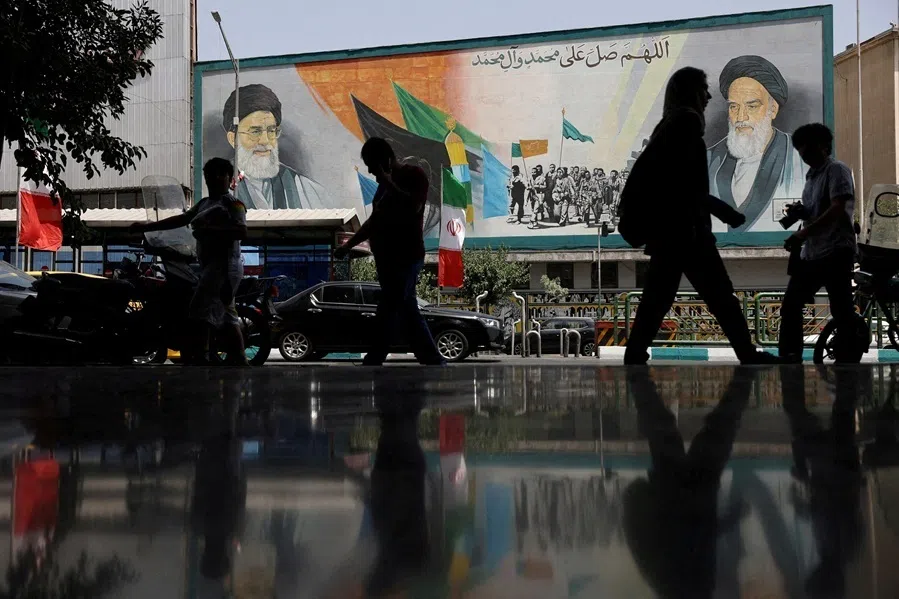
![[Big read] How UOB’s Wee Ee Cheong masters the long game](https://cassette.sphdigital.com.sg/image/thinkchina/1da0b19a41e4358790304b9f3e83f9596de84096a490ca05b36f58134ae9e8f1)
